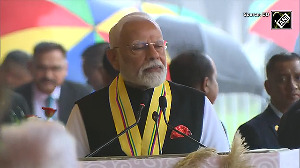Setting the stage for a major showdown with the White House, the House of Representatives has passed a Democrats-backed war spending bill, which sets a timetable for withdrawal of US troops from Iraq, and the Senate is expected to follow suit.
Brushing aside a threat by President George W Bush to veto the bill, the House late Wednesday night passed it by a 218-208 vote, which was preceded by mounting rhetoric and even exchange of insults by Democrats and Republicans.
The Senate is also expected to pass the $124 billion war spending bill along party lines despite the pleas of the top American military commander in Iraq, Gen David Petraeus, who gave closed door presentations of the ongoing operations in Baghdad to lawmakers until late Wednesday evening.
The Democrats, who dominate the Congress, hope to send the legislation to the White House on Monday -- exactly four years after President Bush declared that major combat operations had ended in Iraq.
"How many more suicide bombs must kill American soldiers before this President offers a timeline for our troops to come home?" asked lawmaker Patrick J Murphy, an Iraq war veteran who lost nine fellow paratroopers this week in one of the deadliest attacks in Iraq.
"How many more military leaders must declare the war will not be won militarily before this President demands that the Iraqis stand up and fight for their country? How many more terrorists will President Bush's foreign policy breed before he focuses a new strategy, a real strategy? This bill says enough is enough," Murphy said.
The voting was mostly along party lines with only 13 House Democrats opposing the Bill and two Republicans voting for the legislation.
The White House, which has insisted that there should be no conditions attached to the war funding, said the Bill tells the enemy 'we have surrendered.'
"Tonight, the House of Representatives votes for failure in Iraq, and the President will veto its bill," White House Deputy Press Secretary Dana Perino said in a statement, adding, "It says, you must leave on this day and we think that tells the enemy that they have won and that we have surrendered."
The legislation has set requirements for resting, training and equipping troops but would grant the President the authority to waive those restrictions, provided he publicly justifies the waivers.
The Bill also sets benchmarks for the government in Baghdad to meet like creating a programme for the disarming of the militias and approve a law on sharing oil revenue.
The Bush administration must make a determination by July one that the benchmarks are being met or else the troops will start coming home, the goal being the withdrawal will be complete by the end of the year.
But if the benchmarks are being met, troops would begin coming home no later than October one, with a goal of completing the troop pullout by April 1, 2008.
But some American forces will remain to protect US facilities and diplomats, pursue terrorist organisations, and train and equip Iraqi security forces.
The White House veto is expected but liberal anti-war groups led by Democrats in the Congress are planning major rallies and signature campaigns across the country as soon as Bush vetoes the legislation.
"Our troops are mired in a civil war with no clear enemy and no clear strategy for success," said House Majority Leader Steny Hoyer, a Democrat, said.
But Republican Jerry Lewis countered, "Al-Qaeda will view this as the day the House of Representatives threw in the towel."
Ahead of the vote, political mudslinging intensified on Capitol Hill as Vice President Dick Cheney accused Senate Majority Leader Harry Reid of blindly opposing the Iraq war for political gains and the latter responded by describing Bush's deputy as nothing more than an 'attack dog.'
Bush has been vehemently opposing the bill.
"They chose to make a political statement. That is their right, but it is wrong for our troops and it is wrong for our country. To accept the bill proposed by the Democratic leadership would be to accept a policy that directly contradicts the judgment of our military commanders," he had said on Tuesday.
The Bill ultimately sets a non-binding goal for combat operations in Iraq to end by April one, next year.






 © 2025
© 2025